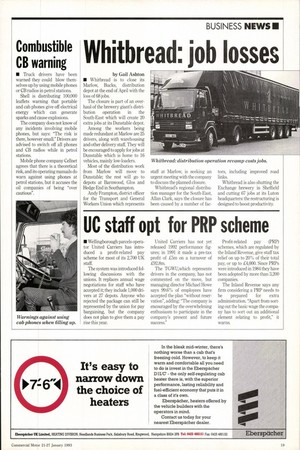UC staff opt for PRP scheme
Page 21

If you've noticed an error in this article please click here to report it so we can fix it.
• Wellingborough parcels operator United Carriers has introduced a profit-related pay scheme for most of its 2,700 UK staff.
The system was introduced following discussions with the unions. It replaces annual wage negotiations for staff who have accepted it; they include 1,000 drivers at 27 depots. Anyone who rejected the package can still be represented by the union for pay bargaining, but the company does not plan to give them a pay rise this year.
United Carriers has not yet released 1992 performance figures; in 1991 it made a pre-tax profit of £5m on a turnover of £92.8m.
The TGWU,which represents drivers in the company, has not commented on the move, but managing director Michael Howe says 99.6% of employees have accepted the plan "without reservation", adding "The company is encouraged by the overwhelming enthusiasm to participate in the company's present and future success."
Profit-related pay (PRP) schemes, which are regulated by the Inland Revenue, give staff tax relief on up to 20% of their total pay, or up to £4,000. Since PRPs were introduced in 1984 they have been adopted by more than 3,200 companies.
The Inland Revenue says any firm considering a PRP needs to be prepared for extra administration. "Apart from sorting out the basic wage the company has to sort out an additional element relating to profit," it warns.












































































